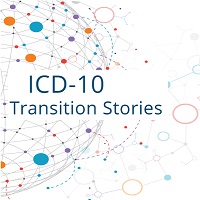 Organizations from across the industry weigh in on their experiences with ICD-10 in the weeks following the October 1st implementation date:
Organizations from across the industry weigh in on their experiences with ICD-10 in the weeks following the October 1st implementation date:
Pediatric Associates of Stockton
“As an independent pediatric practice, we knew that making the transition to ICD-10 was solely on our shoulders. When the whole process began many years ago, we too began that process. Reading everything we could about the subject, talked to our vendors, and made a plan for the transition. Then it was put on hold, a few times. So when the rule came down that it was finally going to happen with no further delays, we were pleased. Finally we would be able to implement our long awaited plan. My staff were trained, my providers were raring to go. In fact they began charting for and using ICD-10 a few months before it went live, causing my billing staff to transfer the diagnosis coding back to ICD-9 so the insurance carriers would accept the claims. But this was a great way for all to become accustomed to the new coding.
We had lots of help from many sources who offered free training for my providers and staff: the medical society, local IPAs, and our EHR vendor. Their help was vital in our successful transition.
As a result, we made sure all claims were able to submitt with appropriate ICD-10 codes from the get go. To this day, we have received just a handful of denied claims. And ALL of those were ones where the insurance carrier had made a mistake. We educated them on proper coding and then the claims were paid. Outside of this handful of claims, we have experience no delays in payment from any of the 100 plus carriers we deal with. We were pleasantly surprised.
This whole transition has gone very smoothly with very minimal cost to the office. Our overall expenditure has been less than $300.00 for an office of 7 providers and 17 staff.” – Sue Zumwalt, CMM, HITCM-PP, CPEDCS, Practice Administrator
Gastrointestinal Associates, P.C., Washington, D.C.
In our transition from ICD-9 to ICD-10 we had a few glitches. One of our screening codes was denied, but there was a better one to replace it. We were watching for denials of codes with .9 or unspecified, and received a couple claims back which were fixed immediately. There have been no code problems with diagnostic tests or prescription authorizations. Our Medicare carrier delayed checks until the end of October. While at a PAHCOM conference in late October I questioned other managers who stated that they were receiving Medicare checks earlier in the month with ICD-10 codes. My physicians were hesitant at first with the changes because we are non- EMR, but are now comfortable. Since the end of October it has been smooth sailing. – Rebecca Moore, CMM, Practice Administrator
Blue Cross Blue Shield of Michigan
“BCBSM’s ICD-10 implementation went very smoothly. Call center volumes and overall inquiries are very low. Professional and facility claims are processing as expected. A few issues noted, which we are resolving, but nothing major to report. Received kudos from our hospitals stating that BCBSM was the first payer to pay ICD-10 claims and these claims are paying as expected. Hospitals are not reporting any major issues. Other Payers (Priority, Cigna, Aetna) are reporting the same experience in that they are not seeing any major issues.”
Nemours Children’s Health System
“From my perspective as a practicing doctor and as a physician leader on the ICD-10 preparation team, the transition on Oct. 1 went extraordinarily well thanks to the many years of work by staff members across our health system. I was in clinic on Oct. 1 and encountered very minimal workflow disruption. Additionally, our patients did not experience delays or problems associated with the ICD-10 transition. The next step is to see how it goes with payers in the coming months, but I am optimistic.” – Bonnie Hudak, M.D., practicing pediatric pulmonologist
Metropolitan Chicago Healthcare Council (MCHC)
“As a member of the national Coalition for ICD-10, MCHC is proud this transition has been a smooth and efficient process for our members. We believe this transition advances our member’s goals of improving care management and bettering outcomes for the patients and communities they serve.”
Centegra Health System
“Centegra Health System was prepared for a smooth ICD-10 transition after two years of careful planning. Our information technology systems have been updated and our educational plans were deployed to help with the initial roll-out. Looking ahead, we will closely monitor ICD-10’s impacts to productivity, denials and payment variances and focus our efforts on our strategic response to these results. We are grateful that MCHC supported our readiness for this long-awaited transition.” – David Tomlinson, Executive Vice President, Chief Financial Officer and Chief Information Officer
Children’s Healthcare of Atlanta
“Children’s Healthcare of Atlanta is pleased with the transition to ICD-10 so far. In the first week we’ve only had a handful of issues and believe that our investments in provider and coder training, claims testing with payers, and an active project team representing all impacted areas of the organization helped to minimize the number issues we experienced on the first days of the transition. We have begun to submit claims using the new code sets and are watching our payers’ claim acceptance and denial rates very closely.”
Northwest Community Healthcare
“Northwest Community Healthcare’s transition to ICD-10 has been smooth. This is due, in part, to our early clinical rollout of ICD-10 with our Epic Go-Live date of May 1, 2015.” – Stephen Scogna, President and Chief Executive Officer
Advocate Health Care
“Advocate has been able to manage this transition well. With ICD-10, we’re able to make more informed decisions which leads to better outcomes for our patients.” – Lou Schraffenberger, MBA, RHIA, CCS, CCSP
This article was originally published on Coalition for ICD-10.
